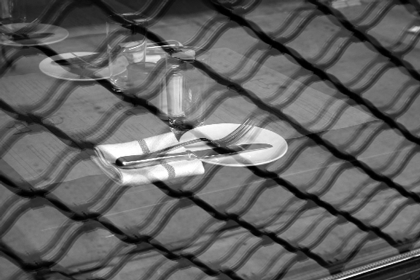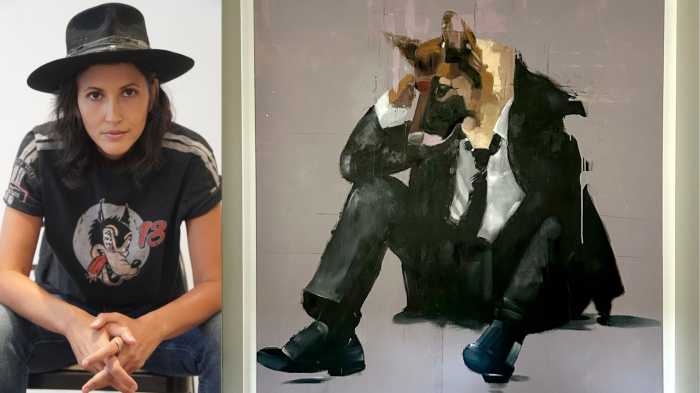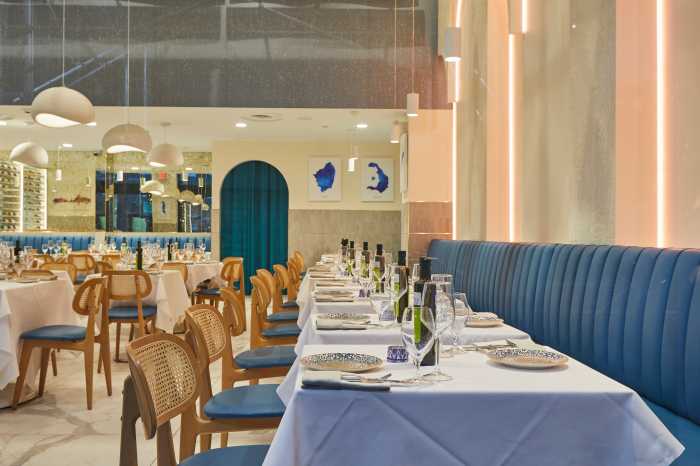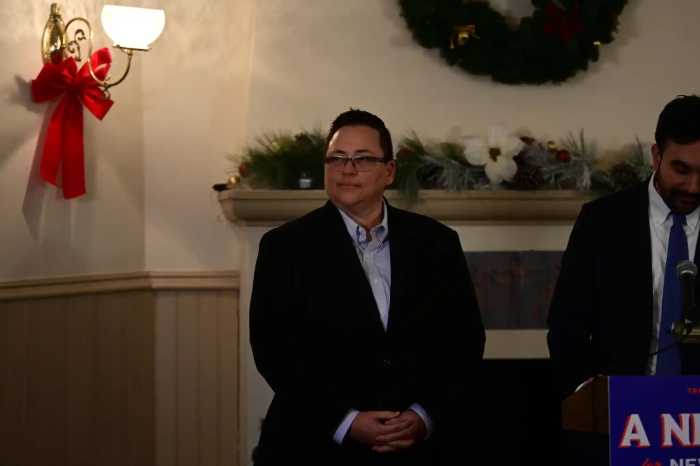By Lincoln Anderson
Bob Giraldi remembers when he was directing the music video for Michael Jackson’s “Beat It.” It had been Jackson’s idea to do the video with real Bloods and Crips, and as the rival gang members stood facing off in the studio, things began to get tense, to say the least. Giraldi decided that to defuse things, he would do the dance number on the first day, instead of on the second day, as originally planned. Jacko danced, the Bloods and Crips watched in awe and then Giraldi told the gangbangers not to come back the next day.
But whether Giraldi, who has since become a well-known restaurateur can as adroitly resolve his battle with neighbors over his latest place, E.U., a $1 million gastropub on E. Fourth St. near Avenue B, remains to be seen.
“I would say, Michael and the Crips and Bloods — it’s about equal to dealing with the E. Fourth St. Block Association,” Giraldi said last Friday after having had his first official sit-down with the block association the night before. While no one was wearing colored bandanas signaling affiliations, the situation was tense at times, though Giraldi put a positive spin on things.
“I thought it went well, a couple of little bumps in the road. That’s what jawing is,” he said. “I think it was productive. They said they would now have to think about it, regroup, decide what position to take.”
Within the week, the representatives of the buildings on E. Fourth St. between Avenues A and B will meet again and vote whether to support or oppose Giraldi’s application for a beer and wine license for E.U. The gastropub was open about a month, but, after Giraldi realized that he couldn’t run it profitably without alcohol, he closed it a few weeks ago, only temporarily, he hopes. In March, the State Liquor Authority, agreeing with the argument of Community Board 3 and neighbors that the lower Avenue B area is saturated with establishments with liquor licenses, denied E.U.’s application for a full liquor license.
Ellyce di Paola, a member of the block association who lives two doors down from E.U., of which she has been a vocal opponent, said the block association, in its letter inviting Giraldi to the meeting, specifically asked him to give a presentation on the restaurant. But Giraldi declined, saying the presentation was the month that the gastropub was open. There was some discussion of what Giraldi might do to appease neighbors, such as stipulations on hours of operation, local hiring and trash collection. But these arrangements will be worked out if the block association agrees to negotiate.
“He said he had no presentation ready. He wanted to talk agreements, terms,” di Paola said. “We said, ‘That’s not why we had the meeting.’ ”
John Fout, from Councilmember Rosie Mendez’s office, and a representative of Good Old Lower East Side, the tenants advocacy group, sat in with the block association members, monitoring the discussion, while joining the E.U. contingent was Bernadette Nation, a representative of the Department of Small Business Services. Giraldi also brought along a few people who live nearby — though not actually on the block — who were among the 1,000 people who signed a petition in support of the restaurant.
Last Friday, di Paola said she thinks the block association members are “leaning in favor of opposing,” yet she has also recently said it was looking “50/50” whether they’ll reject the beer and wine application.
Concern continues about E.U.’s garde-manger, a white counter near two windows that swing open onto the sidewalk. In an interview, Giraldi said that residents have nothing to fear about the windows or the garde-manger, an area for preparing cold foods, like a raw bar, salads and sandwiches.
“We’re not zoned for outside,” Giraldi said. “So we can’t exchange or serve food outside. And we don’t intend to. The fact is that the windows open — probably on nice days I would have them open. People enjoyed them when they were open. The windows are aesthetic and they’re for air and they’re beautiful.”
In general, Giraldi said, his customers won’t be out on the sidewalk. Restaurant diners don’t smoke the way bargoers do, he noted. As for fears of high volume, he said there’s no way he would be able to serve 300 customers a night at the 86-seat place, though he wishes his business could be that good.
“From these lips to God’s ears, but I don’t think I’ll do that business there,” he said.
Di Paola said that when she was quoted in a previous Villager article as saying there had been “100 people” outside E.U. one night when it was open, she, in fact, had meant that there had been 100 people on the street, in general, meaning the neighborhood is already inundated. The most people she ever saw at one time outside the restaurant was 15 — but she said 15 people can make a lot of noise.
Meanwhile, di Paola said she’s not wowed by E.U.’s pricey cuisine, and isn’t particularly interested in sampling Chef Gwenael Le Pape’s fancy braised beef cheek. A beefsteak around the corner at Le Gamin, a more affordable alternative, suits her just fine, she said.
Neil Tepper, the E.U. building’s landlord, said that he had wanted to attract an upscale restaurant to the space. A lot of nightclubs approached him about the space, but he wasn’t interested, he said, wanting to rent “to a nice place.” Tepper said, in the end, it came down to an upscale French restaurant and E.U. The space was formerly occupied by a church, but had been empty a year before E.U. came in. The space’s certificate of occupancy wasn’t changed to allow for an eating and drinking establishment in 1999, when Tepper and partners bought the building, but sometime after E.U. came into the picture, he said.
“I think he’s getting the raw end of the deal from both the community and the S.L.A.,” Tepper said of Giraldi. “They built a beautiful place there. This is a bar area, but I don’t think he wanted to make it predominantly a bar.”
Wanting to show they are community-minded people, Patti Greaney, Giraldi’s wife, reached out to Susan Stetzer, Community Board 3 district manager, for some suggestions on how to get involved. Stetzer pointed Greaney toward the Lower Eastside Girls Club. Greaney got four of her girlfriends to take Girls Club members under their wing for one-day internships; one friend who is a lawyer showed three girls around the courts and the girls really enjoyed it, Greaney said. Greaney also put the club in contact with a wedding cake maker who plans to do a workshop with the club’s baking program in either July or September.
Lyn Pentecost, the Lower Eastside Girls Club’s executive director, said, “E.U. has done a considerable amount” helping out the club.
“She did get us lots of great mentors for a program we do each year at spring break,” Pentecost said. “And her friend the cake decorator did call and is going to help us develop some wedding cakes.” The impression of a club staff member who worked with Greaney is that she is “genuine and well intentioned,” according to Pentecost.
Deputy Inspector Dennis De Quatro, Ninth Precinct commanding officer, said he’s not going to weigh in on the debate other than to support his previous letter to the State Liquor Authority asking that the 500-foot rule be enforced. Under this rule, the only way a liquor license can be granted to a new bar or restaurant that is within 500 feet of existing liquor licenses is for the S.L.A. to rule that issuing the license would be in the “public interest.”
“The letter was not to target E.U.,” De Quatro stressed. “It was merely to give my opinion of how the 500-foot law affects my ability to police the community.” But he said he won’t say whether he supports E.U.’s application or not, noting, “I think if I expressed an opinion one way or the other, it could tip the scale.”





































